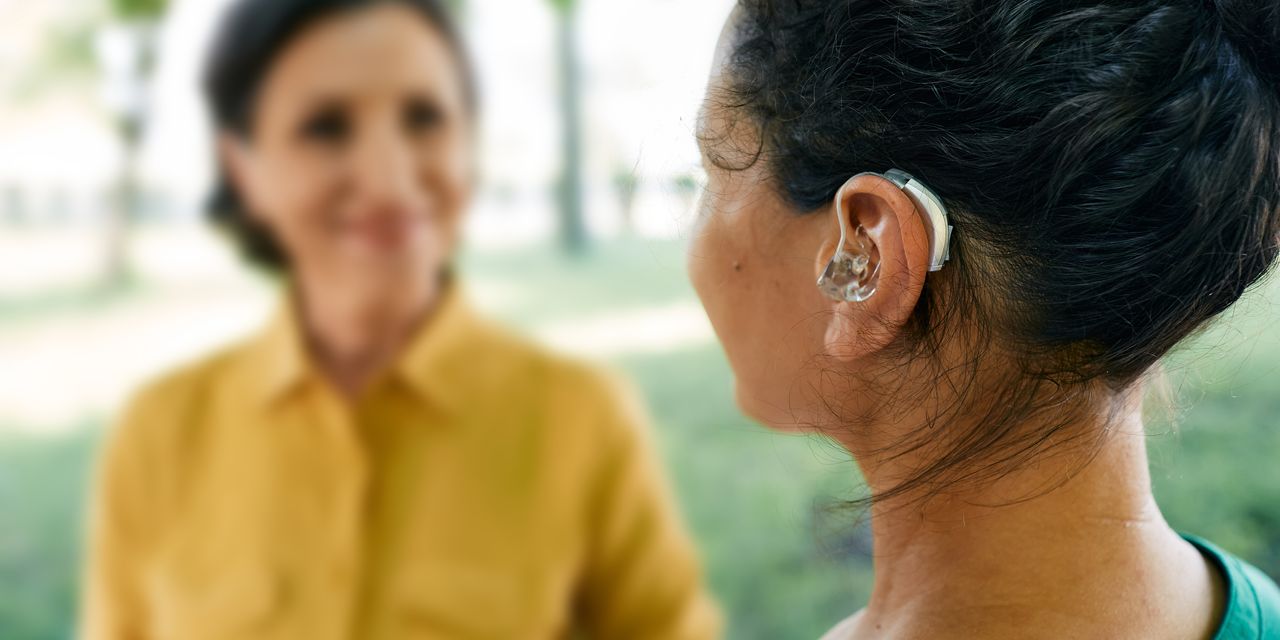
With the arrival of over-the-counter hearing aids, there’s a lot to sift through in terms of types of devices and what to look out for. Here’s a guide to get started.
The Food and Drug Administration issued final regulations in August, opening the door to over-the-counter hearing aid sales on Oct. 17, nationwide — without a prescription. The hearing aids can now cost hundreds of dollars, rather than several thousands. The White House estimated that people could see nearly $3,000 in savings when they buy over-the-counter devices.
Read: Walmart to begin selling hearing aids
About 15% of American adults (37.5 million) aged 18 and over report some trouble hearing, according to the National Center for Health Statistics. The OTC devices are not meant for children or adults with severe hearing difficulties, according to the National Institutes of Health.
Although hearing aids can’t restore normal hearing, they can improve your hearing by amplifying sounds that you’ve had difficulty hearing, according to the Mayo Clinic. OTC hearing aids make sounds louder so adults are better able to listen, communicate, and participate in daily activities.
Read: People who do this one thing every day have half the dementia risk that the rest of us do
The impact of hearing loss can be far-reaching, and it’s crucial to address it. If you have hearing loss, you have a greater chance of developing dementia, according to a 2020 Lancet commission report that listed hearing loss as one of the top risk factors for dementia.
Now, with the OTC availability, adults will be able to try a device on their own rather than seeing a doctor and/or audiologist.
“It’s nice to have a robust market. We may see some products that meet people in rudimentary ways. It democratizes what you get and offers a whole pyramid of care. Before we just had a fence — and you were either on one side or the other,” said Nicholas Reed, assistant professor with the Cochlear Center for Hearing and Public Health at the Johns Hopkins Bloomberg School of Public Health.
Consumers should look for the words “over-the-counter hearing aids” on the package, which distinguishes it from a personal amplification device, which is regulated as a consumer electronic, not a medical device regulated by the U.S. Food and Drug Administration (FDA).
On a cautionary note, Janice Lintz, a hearing access consultant, said consumers should be careful when purchasing over-the-counter aids because there is no performance testing on the products and no data available to compare models.
“Honestly, I don’t know how you buy a hearing aid without data. It doesn’t make any sense to me,” Lintz said. “Drawing the price down is critical, but we just need to make sure they are what they are promised to be. We need to make sure that what you’re buying isn’t garbage.”
An OTC hearing aid can be less expensive than seeing a physician and audiologist.
According to AARP, insurance coverage for hearing care is limited as many commercial health insurance plans do not cover hearing services or aids. Traditional Medicare does not cover hearing exams, except in certain circumstances. Nor does the program pay for hearing aids or fitting services. People who have Medicare Advantage plans have limited coverage for hearing care but can still face out-of-pocket costs.
Things to be aware of when shopping for OTC hearing aids:
—First, rule out any minor, fixable ear problems such as an abundance of ear wax. If you have red flag issues such as a sudden loss of hearing, ringing in your ears or ear pain—see a physician.
—OTC hearing aids are for mild to moderate hearing loss. “There are different degrees of hearing loss, and while any amount makes a person eligible for hearing aids, the new over-the-counter variety is only available for people who experience mild to moderate hearing loss. This is why it’s important for people to see a professional and have them conduct an audiogram in order to determine their individual needs and treatment options,” said Robin Carson, audiologist expert for ear care company Eosera.
“Although the shift to over-the-counter hearing aids might seem more convenient, and also opens the door to new innovations in technology, I would still highly recommend seeking a doctor of audiology to help patients make the best decisions to correct hearing loss,” Carson said.
“There are many different types of hearing aids in terms of style, technology, and manufacturer, and which one is best greatly depends on the individual patient. Doctors can present a variety of options and advice on the one that works best for the person’s degree of hearing loss and lifestyle. There’s also a high level of care necessary to keep devices working properly and to ensure a correct fitting, which is hard to maintain without a professional. There should never be a one-size-fits-all approach,” Carson said.
—Look for flexible return policies because it can take several weeks to get used to a hearing aid and set it correctly, said Barbara Kelley, executive director of the Hearing Loss Association of America. Unlike traditional prescription hearing aids, which have legally-mandated trial periods in many states, there is no mandated return window for over-the-counter hearing aids, said Lindsay Creed, an audiologist and associate director or audiology practices with the American Speech-Language-Hearing Association. It will be up to manufacturers to set return policies, so make sure you know what the policy is before you make your purchase, Creed suggested. “It’s kind of crazy that you can spend $1,000 on something and not be able to return it.”
—Be aware of who should NOT try to get an OTC hearing aid. At the top of this list: anyone under age 18, Creed said. Parents may think they’re doing the right thing by obtaining a hearing aid for a child or teen with hearing loss, but they can actually end up doing more harm than good. “I worry about the teenagers, I worry about the parents that think they’re helping their child and just not knowing that it could hurt them,” Creed said. “You can’t get your hearing back if you damage it beyond repair.”
OTC hearing aids are also not a good option for people whose hearing loss may be tied to an underlying medical condition. This may be the case if you have symptoms such as ringing in one ear or hearing loss that’s only in one ear. In those situations, see a doctor first.
—Check to see if the hearing aid needs additional devices to be used, such as a smartphone. “Some people may not be comfortable with that technology, so that would not be a good choice for them. Check to make sure you know what you’re buying,” Kelley said.
—Where to buy an OTC hearing aid:
Walmart: The retailer WMT, +0.72% is offering hearing aids ranging from $199 to $999 per pair. Options include top brands like Lexie powered by Bose and HearX that will offer technology like Bluetooth and self-tuning app capabilities. The hearing aids are available on Walmart.com and Walmart Vision Centers in Colorado, Michigan, Missouri, Ohio, Pennsylvania, Tennessee and Texas, as well as Sam’s Club Hearing Aid Center locations. OTC hearing aids will soon be available at additional Walmart Vision Centers nationwide, the company said.
Walgreens: The pharmacy chain WBA, -0.72% will sell Lexie Lumen hearing aids at Walgreens stores nationwide and online for adults ages 18 and older with mild-to-moderate hearing loss. The cost is $799. Consumers can also purchase them online through Walgreens Find Care for $39 per month for 24 months. Each purchase includes a pair of hearing aids, batteries and accessories and a 45-day money back guarantee.
CVS: The pharmacy chain CVS, +1.78% features different brands and models ranging from $199 to $999 on CVS.com. CVS pharmacy locations will begin selling the devices in November.
Best Buy: The consumer electronics retailer BBY, +3.54% had more than a dozen models listed on its website, including Lexie Hearing, Nuheara, Jabra Enhance Plus, Lucid Hearing and Eargo. Prices ranged from about $200 to $2,950.











Add Comment